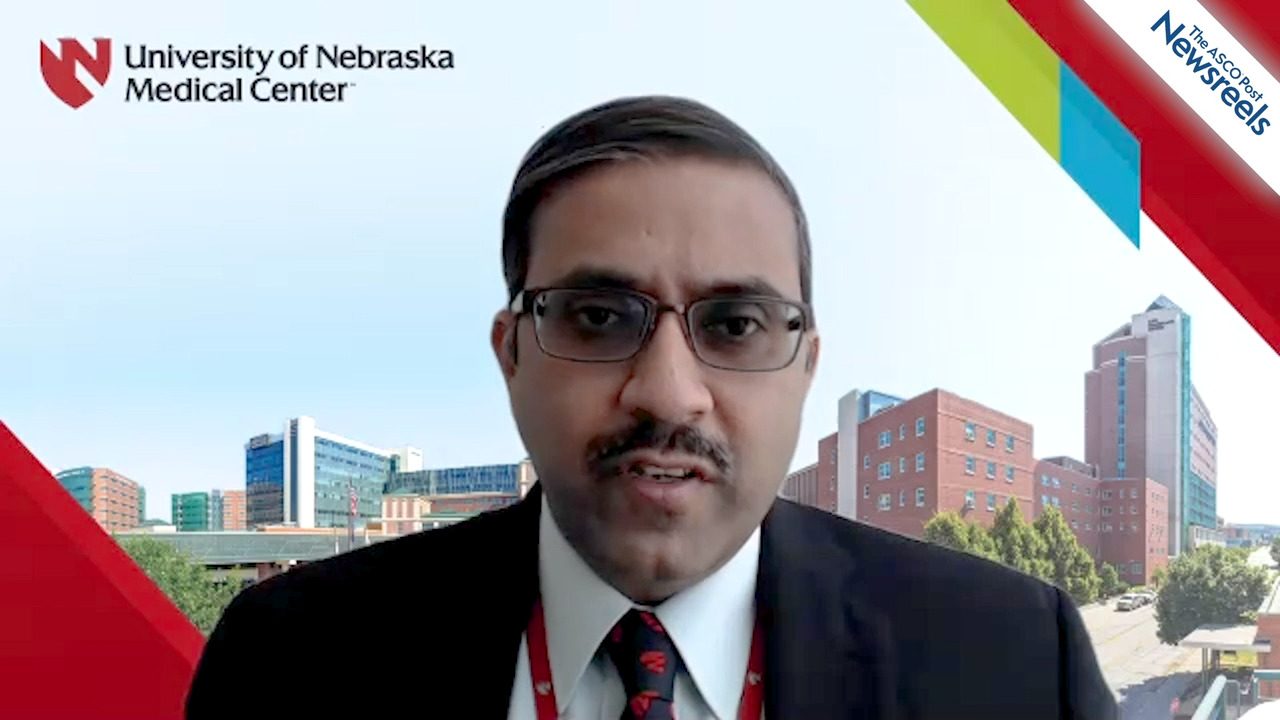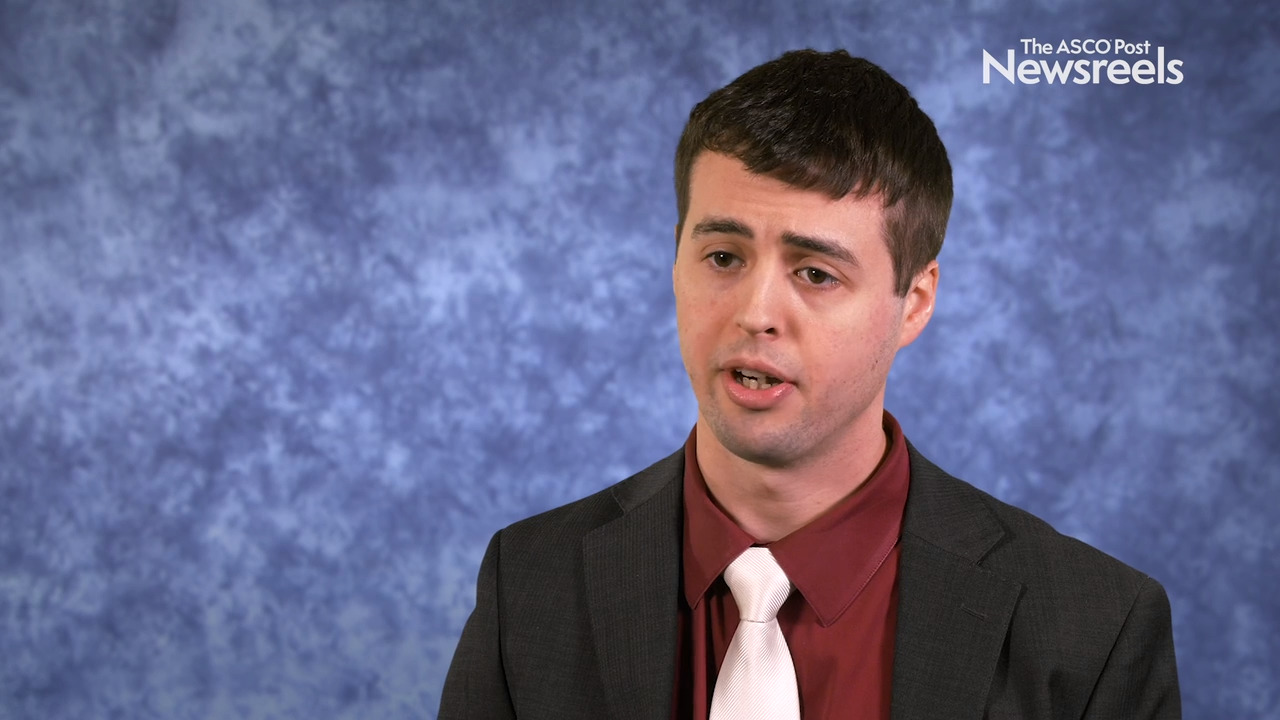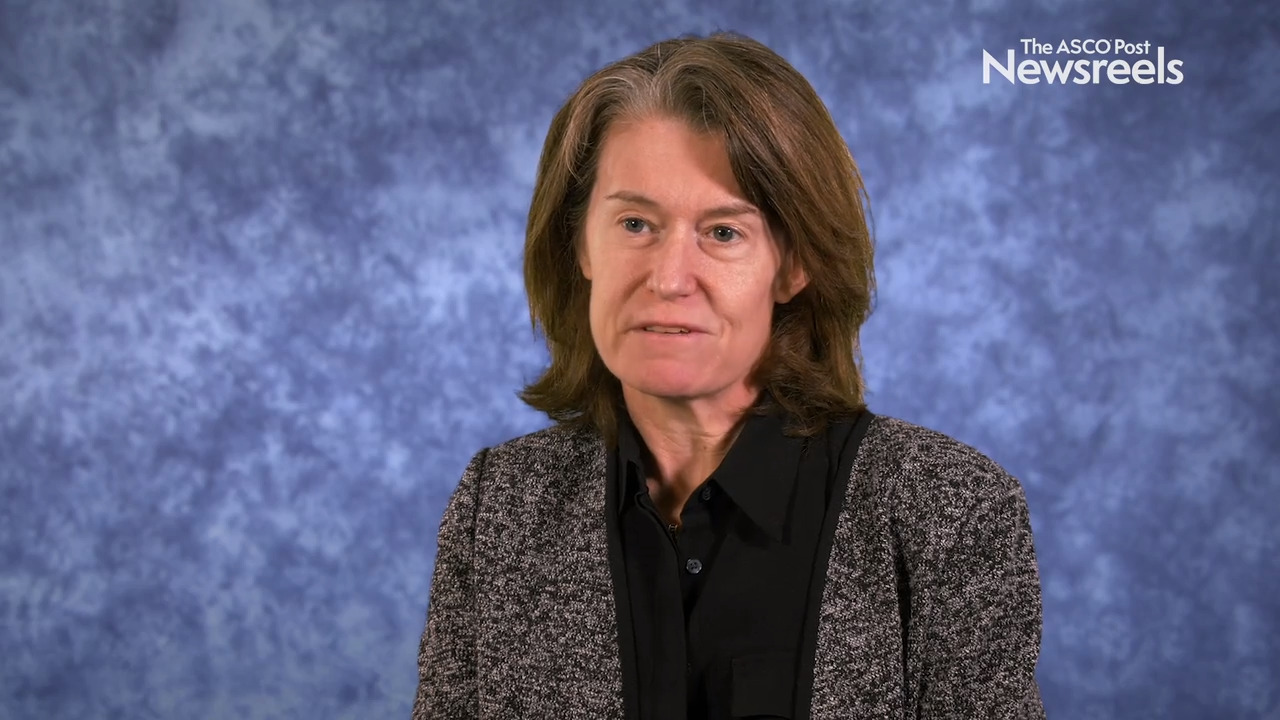FDA Approves Selpercatinib for Lung and Thyroid Cancers With RET Mutations or Fusions
On May 8, 2020, the U.S. Food and Drug Administration (FDA) granted accelerated approval to selpercatinib (Retevmo) for the following indications: Adult patients with metastatic RET fusion–positive non–small cell lung cancer (NSCLC) Adult and pediatric patients ≥ 12 years of age with advanced or...
Durvalumab Plus Chemotherapy for Extensive-Stage Small Cell Lung Cancer
On March 27, 2020, durvalumab (Imfinzi) was approved for use in combination with etoposide and either carboplatin or cisplatin as first-line treatment of patients with extensive-stage small cell lung cancer.1,2 Supporting Efficacy Data Approval was based on the findings of the open-label phase III ...
Addition of Pembrolizumab to Docetaxel for Previously Treated Immunotherapy-Naive Patients With Advanced Lung Cancer
In the single-institution phase II PROLUNG trial reported in JAMA Oncology, Oscar Arrieta, MD, and Christian Rolfo, MD, PhD, and colleagues found that the addition of pembrolizumab to docetaxel improved objective response rates and progression-free survival in immunotherapy-naive patients with...
FDA Approves Capmatinib for Patients With Metastatic NSCLC With Confirmed MET Exon 14 Skipping
On May 6, 2020, the U.S. Food and Drug Administration (FDA) granted accelerated approval to capmatinib (Tabrecta) for adult patients with metastatic non–small cell lung cancer (NSCLC) whose tumors have a mutation that leads to mesenchymal-epithelial transition (MET) exon 14 skipping as detected by...
FDA Pipeline: Priority Review in AML, Fast Track Designations for Pancreatic Cancer and Neuroendocrine Tumors
Over the past 2 weeks, the U.S. Food and Drug Administration (FDA) granted Priority Review to a treatment for acute myeloid leukemia (AML); Fast Track designations for agents in pancreatic cancer and pancreatic/nonpancreatic neuroendocrine tumors; approvals for companion diagnostic tests;...
AACR 2020: Mortality Rate in Patients With Thoracic Cancers Infected With COVID-19
First results from the TERAVOLT (Thoracic cancERs international coVid 19 cOLlaboraTion) registry for thoracic cancers—presented by Marina C. Garassino, MD, at the American Association for Cancer Research (AACR) Virtual Annual Meeting in the COVID-19 and Cancer Session—indicate a high mortality rate ...
AACR 2020: ctDNA May Be a Prognostic Biomarker of Disease Recurrence in Patients With Lung Cancer
The TRACERx study investigated phylogenetic tracking and minimal residual disease (MRD) detection using circulating tumor DNA (ctDNA) profiling following resection in patients with stage I to III non–small cell lung cancer (NSCLC). Investigators found that ctDNA is an adjuvant biomarker capable of...
What’s the Current Status of Neoadjuvant Immunotherapy?
For several tumor types, can the successes achieved with immunotherapy in the metastatic and adjuvant settings be replicated in the neoadjuvant setting? An explosion in clinical trials—with more than 300 listed on ClinicalTrials.gov—point to “yes.” “The neoadjuvant use of immunotherapy is of great ...
Addition of Pembrolizumab to Docetaxel for Previously Treated Immunotherapy-Naive Patients With Advanced NSCLC
In the single-institution phase II PROLUNG trial reported in JAMA Oncology, Arrieta et al found that the addition of pembrolizumab to docetaxel improved objective response rate and progression-free survival in immunotherapy-naive patients with advanced non–small cell lung cancer (NSCLC) who...
First-Line Durvalumab With or Without Tremelimumab vs Chemotherapy for Metastatic NSCLC: MYSTIC Study
As reported in JAMA Oncology by Naiyer A. Rizvi, MD, and colleagues, the phase III MYSTIC trial showed no overall survival benefit with durvalumab vs chemotherapy, or overall or progression-free survival benefit with durvalumab/tremelimumab vs chemotherapy, as first-line treatment in patients with...
Apar Kishor Ganti, MD, on NSCLC: Real-World Adherence and Persistence of ALK Inhibitors
Apar Kishor Ganti, MD, of the University of Nebraska Medical Center, discusses his study findings, which show that alectinib was associated with longer treatment persistence and comparable adherence to other ALK inhibitors (Abstract HSR20-084).
Activity of Pembrolizumab in Patients With NSCLC Brain Metastases
As reported in The Lancet Oncology by Sarah B. Goldberg, MD, MPH, and colleagues, continued follow-up of the non–small cell lung cancer (NSCLC) cohort of a single-institution phase II trial showed that pembrolizumab produced responses in patients with brain metastases and programmed cell death...
FDA Pipeline: Priority Reviews for Immunotherapy Based on Biomarker Status, Combination First-Line Therapy in Lung Cancer
Over the past week, the U.S. Food and Drug Administration (FDA) granted Priority Review to an immunotherapeutic agent for solid tumors with a high tumor mutational burden and to a combination treatment for the first-line treatment of metastatic or recurrent non–small cell lung cancer. The agency...
Expert Point of View: Timothy A. Yap, MBBS, PhD, FRCP
Semaphorin 4D (SEMA4D, and its receptor, plexin B1) is broadly expressed in malignant tumors. Aside from other “normal functions” in tumors, SEMA4D influences the infiltration and distribution of leukocytes into the microenvironment, and its inhibition promotes functional immune infiltration....
SEMA4D Inhibition: A Novel Means of Improving Immune Response
A novel class of inhibitors may hold some promise for boosting responses to checkpoint inhibitors and for sensitizing poorly immunogenic tumors, such as pancreatic cancer, to immunotherapy. The drug targets semaphorin 4D (SEMA4D), a glycoprotein expressed on the cell membranes of many tumor types....
Second-Line Lurbinectedin in Small Cell Lung Cancer
As reported in The Lancet Oncology by Trigo et al, second-line treatment with the selective oncogenic transcription inhibitor lurbinectedin showed activity in patients with small cell lung cancer included in a phase II basket trial. The trial includes cohorts representing nine different tumor...
Disparities in Receipt of Chemotherapy Among Patients With pN1 Lung Cancer
In patients with non–small cell lung cancer (NSCLC) where the cancer has spread to one or more lymph nodes close to the lungs—a condition known as pathologic N1 (pN1) disease—current guidelines recommend a two-part protocol: surgical resection, followed by chemotherapy. However, a retrospective...
Imaging-Based Radiotherapy Target Volume Reduction in Locally Advanced NSCLC
In a European trial (PET-Plan) reported in The Lancet Oncology, Nestle et al found that the use of reduced radiotherapy target volumes determined by 18F-fluorodeoxyglucose positron-emission tomography (FDG-PET) alone may achieve improved local control vs conventional target planning with...
FDA Approves Durvalumab as Part of a First-Line Combination Regimen for Extensive-Stage SCLC
On March 27, the U.S. Food and Drug Administration (FDA) approved durvalumab (Imfinzi) in combination with etoposide and either carboplatin or cisplatin as first-line treatment of patients with extensive-stage small cell lung cancer (SCLC). CASPIAN Trial Efficacy of this combination in patients...
Patients With Certain Cancers May Be at a Higher Risk for Atrial Fibrillation
People with a history of cancer have an over twofold risk of developing atrial fibrillation, the most common heart rhythm disorder, compared to the general population, according to research presented at the American College of Cardiology’s Annual Scientific Session (Abstract 1216-235). In...
Updated Analysis From KEYNOTE-189: Adding Pembrolizumab to Pemetrexed/Platinum for Nonsquamous NSCLC
An updated analysis from the phase III KEYNOTE-189 trial, reported by Shirish Gadgeel, MB, BS, and colleagues in the Journal of Clinical Oncology, indicated that the addition of pembrolizumab to pemetrexed/platinum chemotherapy continues to be associated with progression-free and overall survival...
FDA Pipeline: Breakthrough Therapy for NSCLC With Specific Mutation, Approval of Test for Cervical Cancer, and More
Over the past week, the U.S. Food and Drug Administration (FDA) granted Breakthrough Therapy designation to a bispecific antibody for the treatment of patients with metastatic non–small cell lung cancer (NSCLC) with EGFR exon 20 insertion mutations; granted approval to a test for human...
Pulmonary Pathology of Early COVID-19 Pneumonia Identified Retrospectively in Two Patients With Lung Cancer
An international team of clinicians and researchers have described the pathology of the novel coronavirus, or COVID-19, for the first time. Their findings were published by Tian et al in the Journal of Thoracic Oncology. The article’s senior author, Shu-Yuan Xiao, MD, from the University of Chicago ...
Concurrent Pembrolizumab and Chemoradiotherapy in Locally Advanced NSCLC
In a phase I trial reported in JAMA Oncology, Jabbour et al found that the use of pembrolizumab concurrently with chemoradiotherapy in advanced non–small cell lung cancer (NSCLC) was tolerable, and that progression-free survival with the combination therapy was 69.7% at 12 months. As stated by the...
Plasma-Based Tumor Mutational Burden May Predict Response to Immunotherapy in Patients With Metastatic NSCLC
Patients with non–small cell lung cancer (NSCLC) with higher measures of tumor mutations that show up in a blood test generally have a better clinical response to certain immunotherapy treatments than patients with a lower measure of mutations. A clinical trial showed that in cases where liquid...
Long-Term Outcomes and Retreatment Outcomes With Immunotherapy in PD-L1–Positive Advanced NSCLC
As reported in the Journal of Clinical Oncology by Roy S. Herbst, MD, PhD, and colleagues, long-term follow-up of patients with previously treated advanced programmed cell death ligand 1 (PD-L1)-positive non–small cell lung cancer (NSCLC) in the KEYNOTE-010 trial has shown a continued survival...
FDA Pipeline: Priority Review in Lung Cancer, Breakthrough Therapy Designation in Head and Neck Cancer, and More
This week, the U.S. Food and Drug Administration (FDA) granted Priority Review to brigatinib for the treatment of ALK-positive lung cancer and Breakthrough Therapy designation to a potential first-in-class oral antagonist of inhibitors of apoptosis proteins for the treatment of head and neck...
Trends in Lung Cancer Incidence in Young Women vs Young Men Across 40 Countries
In a systematic analysis of data from 40 countries reported in the International Journal of Cancer, Fidler-Benaoudia et al identified a widespread emergence of higher lung cancer incidence rates in young women vs young men. The trend does not appear to be explained by differences in smoking...
Cancer Has Made Me the Person I Am, and I’m Grateful
The only clue that I was harboring a life-threatening cancer came as I was driving to a golf lesson in the fall of 2006, and I casually rubbed the left side of neck and felt a tiny bump. Although I wasn’t alarmed at the time, I did point out the mass to my primary care physician when I met with...
FDA Pipeline: Priority Reviews in Lung Cancers, Lymphoma
This week, the U.S. Food and Drug Administration (FDA) granted Priority Review to treatments for non–small cell and small cell lung cancers, as well as for diffuse large-B cell lymphoma (DLBCL); Breakthrough Therapy designation to an antibody-drug conjugate for bladder cancer; and a double Fast...
Patient-Reported Outcomes With Addition of Pembrolizumab vs Placebo to Pemetrexed/Platinum for Nonsquamous NSCLC
As reported in The Lancet Oncology by Marina C. Garassino, MD, and colleagues, global health status/quality of life was maintained or improved with the addition of pembrolizumab vs placebo to pemetrexed/platinum therapy for previously untreated metastatic nonsquamous non–small cell lung cancer...
Osimertinib Plus Savolitinib for EGFR-Mutated, MET-Amplified NSCLC After Disease Progression on EGFR Tyrosine Kinase Inhibitors
As reported in The Lancet Oncology, Lecia V. Sequist, MD, and colleagues have found activity and an acceptable risk-benefit profile with the combination of the third-generation EGFR tyrosine kinase inhibitor osimertinib and the MET tyrosine kinase inhibitor savolitinib in patients with EGFR...
ASCO/CCO Update Guideline for Selecting Systemic Treatment in Stage IV NSCLC Without Driver Mutations
ASCO and Cancer Care Ontario (CCO) have published an update to a joint guideline on systemic therapy for stage IV non–small cell lung cancer (NSCLC) without driver mutations.1 “The treatment of stage IV NSCLC has become increasingly more complicated, and, with the advent of immunotherapy and the...
FDA Pipeline: Priority Reviews in Lymphoma, Lung Cancer, GIST, and Breast Cancer
This week, the U.S. Food and Drug Administration (FDA) granted Priority Review to agents in lymphoma, lung cancer, gastrointestinal stromal tumors, and breast cancer, and granted Fast Track designation to a first-in-class radioenhancer hafnium oxide nanoparticle in head and neck cancer. Priority...
Jarrett Failing, MD, on Human Leukocyte Antigen Expression in NSCLC With Brain Metastases
Jarrett Failing, MD, of the Mayo Clinic, discusses his study data, which show some agreement between the expression of human leukocyte antigens in primary non–small cell lung cancer with brain metastasis. His findings may have some bearing on resistance to immune checkpoint inhibitors (Abstract 43).
Elizabeth A. Mittendorf, MD, PhD, on Mobilizing the Immune System to Treat Select Solid Tumors
Elizabeth A. Mittendorf, MD, PhD, of Dana-Farber Cancer Institute and Brigham and Women’s Hospital, summarizes a session she co-chaired on utilizing the immune system in neoadjuvant trials to treat melanoma, breast, and lung cancers.
IASLC Early Lung Imaging Confederation Initiative for Analysis of Low-Dose CT Images
As reported by James L. Mulshine, MD, and colleagues in JCO Clinical Cancer Informatics, the International Association for the Study of Lung Cancer (IASLC) is developing the Early Lung Imaging Confederation (ELIC) “to serve as an open-source, international, universally accessible environment to...
ASCO-SITC 2020: Low Incidence of Nivolumab-Induced Radiation Recall Pneumonitis Among Patients With NSCLC
A multicenter retrospective study investigating the incidence of pneumonitis and the incidence, risk factors, and clinical characteristics of radiation recall pneumonitis in patients with non–small cell lung cancer (NSCLC) who had received nivolumab found the incidence of radiation recall...
ASCO-SITC 2020: Preliminary Results Show Antitumor Activity With Pepinemab/Avelumab in Patients With Advanced NSCLC
Interim results from the CLASSICAL-Lung phase Ib/II clinical trial of pepinemab, an IgG4 humanized monoclonal antibody targeting semaphorin 4D, in combination with the anti–programmed cell death ligand 1 antibody avelumab for patients with advanced NSCLC showed that the treatment is well tolerated...
Effect of Volume-Based CT Screening on Lung Cancer Mortality in High-Risk Patients
As reported in The New England Journal of Medicine by Harry J. de Koning, MD, PhD, and colleagues, the Dutch/Belgian NELSON trial has shown a significant reduction in 10-year lung cancer mortality with volume-based low-dose computed tomography (CT) screening vs no screening in high-risk men. Male...
ASCO Guideline Addresses Surveillance of Lung Cancer After Curative-Intent Therapy
ASCO has released a new guideline providing recommendations to practicing clinicians on radiographic imaging and biomarker surveillance strategies after definitive, curative-intent therapy in patients with stage I to III non–small cell lung cancer or small cell lung cancer. These guideline...
Patient Aid Improved Lung Cancer Screening Informed Decision-Making
In the first comparative clinical trial of lung cancer screening decision aid vs standard educational information, researchers from The University of Texas MD Anderson Cancer Center showed that a decision aid delivered through tobacco quitlines effectively reaches a screening-eligible population...
FDA Pipeline: Priority Review Granted for Treatment in Lung and Thyroid Cancers
This week, the U.S. Food and Drug Administration (FDA) granted Priority Review to a treatment for lung and thyroid cancers with a RET fusion or mutation; gave Breakthrough Therapy designation to a doublet therapy for TP53-mutated myelodysplastic syndromes; and issued an update to their...
Pooled Analysis of Body Mass Index and Overall Survival With Immune Checkpoint Inhibitor Therapy in NSCLC
In a study reported in JAMA Oncology, Kichenadasse et al found that high body mass index was associated with improved overall survival in patients with advanced non–small cell lung cancer (NSCLC) treated with atezolizumab. As noted by the investigators, there are data showing that high BMI is...
STS 2020: Intraoperative Molecular Imaging Technology Helps Surgeons to Detect NSCLC
A tumor-highlighting technology—OTL38—enhances the visualization of lung cancer tissue, providing surgeons with a significantly better chance of finding and removing more cancer than previously possible, according to a scientific presentation by Gangadharan et al at the Plenary Session of the 56th...
FDA Pipeline: Priority Reviews in Multiple Myeloma, Prostate Cancer
Over the past week, the U.S. Food and Drug Administration (FDA) granted Priority Review to treatments for multiple myeloma and prostate cancer; gave Fast Track designation to a targeted gene therapy for lung cancer; granted Orphan Drug designation to a combination therapy for hepatocellular...
Dana-Farber Cancer Institute to Establish Chen-Huang Center for EGFR-Mutant Lung Cancers
Dana-Farber Cancer Institute will create the Chen-Huang Center for EGFR-Mutant Lung Cancers to stimulate research, promote clinical trials, and strengthen the Institute’s capabilities for studying and treating lung cancer. The Chen-Huang Center is being established with a $5 million gift from...
Atezolizumab With Chemotherapy for Metastatic Nonsquamous NSCLC Without EGFR/ALK Aberrations
On December 3, 2019, atezolizumab in combination with nab-paclitaxel and carboplatin was approved for first-line treatment of metastatic nonsquamous non–small cell lung cancer (NSCLC) with no EGFR or ALK genomic tumore aberrations.1,2 The approval was based on findings in the open-label phase III...
Impact of the NCI Cell-Line Database: A Testament to Patient Altruism
In an homage to the gracious patients who provided biospecimens and to the dedicated researchers who have tended and studied the derived cell lines, James L. Mulshine, MD, of the Center for Healthy Aging, Department of Internal Medicine, Rush University, and colleagues have described the impact of...
Entrectinib in Advanced ROS1 Fusion–Positive NSCLC
As reported in The Lancet Oncology by Alexander Drilon, MD, and colleagues, an integrated analysis of three phase I/II trials has shown high activity of the TRK and ROS1 inhibitor entrectinib in ROS1 fusion-positive non–small cell lung cancer (NSCLC). This analysis supported the August 2019 U.S....



